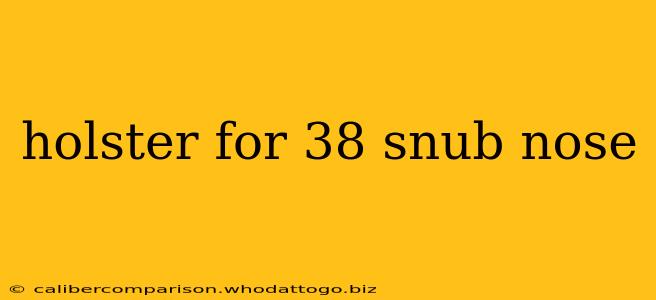Choosing the right holster for your .38 snub nose revolver is crucial for both safety and convenience. This isn't just about finding something that fits; it's about finding a holster that prioritizes secure carry, comfortable wear, and easy access. This guide will help you navigate the world of .38 snub nose holsters, highlighting key features and considerations to make an informed decision.
Understanding Your Needs: Concealed Carry vs. Open Carry
Before diving into holster types, consider your primary carrying method:
-
Concealed Carry: This requires a holster that's designed for discreet concealment, often prioritizing comfort and a low profile. Popular choices include inside-the-waistband (IWB), pocket holsters, and ankle holsters. The size and shape of your .38 snub nose will greatly influence which of these works best for you.
-
Open Carry: This allows for more holster options, focusing on accessibility and retention. Outside-the-waistband (OWB) holsters are the most common choice for open carry, offering a variety of retention methods and mounting options. Shoulder holsters are another option, though they require more planning and awareness.
Types of Holsters for .38 Snub Noses
The market offers a diverse range of holsters, each with its own pros and cons:
1. Inside-the-Waistband (IWB) Holsters
- Pros: Excellent for concealed carry, comfortable for everyday wear, keeps the firearm close to the body.
- Cons: Can be more difficult to draw from than OWB holsters, requires proper clothing to conceal effectively, may require some adjustment to find the perfect fit.
- Best for: Individuals prioritizing concealed carry and comfortable all-day wear.
2. Outside-the-Waistband (OWB) Holsters
- Pros: Easy access, secure retention (depending on the holster type), readily available in various materials and designs.
- Cons: Less concealment than IWB holsters, can be bulkier and less comfortable for everyday carry.
- Best for: Individuals who prioritize quick access and don't require complete concealment.
3. Pocket Holsters
- Pros: Extremely concealable, ideal for deep concealment in pockets, often inexpensive.
- Cons: Can be difficult to draw from quickly, may require a specific type of pocket, less retention than other holster types.
- Best for: Individuals needing extremely discreet concealment, typically for smaller .38 snub noses.
4. Ankle Holsters
- Pros: Extremely concealable, leaves the waistband free for other items.
- Cons: Can be uncomfortable for extended periods, drawing can be slow and awkward, limited capacity for larger revolvers.
- Best for: Individuals who prioritize extreme concealment and don't mind slower draw times.
5. Shoulder Holsters
- Pros: Concealable under a jacket, allows for quick cross-draw access.
- Cons: Can be bulky and uncomfortable, requires more practice for quick and safe draws, can be impractical in some situations.
- Best for: Individuals who prioritize a fast cross-draw and can adapt to the holster's unique considerations.
Key Features to Consider
Regardless of the holster type, several features are vital for a safe and effective carry setup:
- Retention: Look for a holster with a secure retention mechanism to prevent accidental discharge or loss of the firearm.
- Material: Leather, Kydex, and nylon are popular choices, each offering different levels of durability, comfort, and concealment.
- Comfort: A comfortable holster will encourage consistent carry. Consider breathability, adjustability, and the overall feel against your body.
- Accessibility: The holster should allow for a smooth and quick draw, without compromising safety.
Choosing the Right Holster for You
Selecting the perfect holster involves careful consideration of your individual needs, lifestyle, and carrying preferences. It's recommended to try on different holsters, if possible, to experience firsthand how they fit and function. Prioritize safety and comfort above all else, and remember that the best holster is one you'll actually carry consistently. Consulting with experienced firearm owners or professionals at a gun store can be invaluable in making this important decision.

